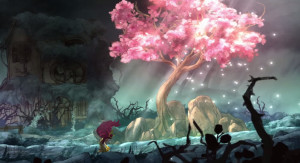Play This: Leave Luck to Heaven
Joel Hans
Every Tuesday, or at some other completely random denomination of time, I’ll be making some gaming-related recommendations. I’m calling it “Play This” for now. Yeah. These might be video games themselves, or books, or articles, or who knows what?
LEAVE LUCK TO HEAVEN
Cartridge Lit contributor Brian Oliu (read “Goonies II” here) has a new book out, Leave Luck to Heaven, from Uncanny Valley Press. The book is a collection of video game-twinged lyric essays that have been published in just about every literary magazine imaginable, including Cartridge Lit (I think we got in there last-minute), and they’re both vicious and tender. They’re short but they feel so much more substantial than their lengths.
This is far more than some nostalgia-fueled homage to 8-bit gaming—Oliu has clearly mastered a form and a technique and these essays accumulate in so many unexpected ways. There’s little in the way of narrative twists or single “darling” sentences. The lyrical writing, for which Oliu is well-known, is about as visceral as it gets: the closest we can get, I think, to living inside these games, and to living inside the memories that are interwoven within the experiences of playing each of the many classics. And as a teachable piece of craft, this is about as good as it gets.
The press itself, which is run by Mike Meginnis and Tracy Bowling out of Iowa City, is open for book-length submissions. They have also published two issues of a literary magazine (but don’t any more) and a handful of pieces online. Check them out at uncannyvalley.com.
Brian’s book can be bought for $12 flat by going to the Uncanny Valley site and clicking that orange-ish “Buy Now” button. So go do that.
CHILD OF LIGHT
Child of Light is a relatively new RPG from Ubisoft Montreal—a departure for the studio that has previously focused primarily on big and bloody franchises like Far Cry and Assassin’s Creed—which puts the player in the role of Aurora, a young (and hopelessly ill) girl from Austria. One day, Aurora wakes into the world of Lemuria, and her real story begins. There’s missing moons and a quirky cast of characters and, naturally enough, an evil force that goes by the name Umbra.
The game will feel familiar to those who have played JRPGs, whether in the 16-bit past or more recently. Each character has different skill tracks that offer various benefits depending on how you want your characters to fit together—focus this one on physical attacks so that another might center around healing? The combat system is actually quite fun, taking the standard Active Time Battle (ATB) system and giving it a unique twist. Characters all progress up the gauge at their own speeds, and various attacks/spells take an additional, and wildly variable, amount of time. The player can then use Igniculus, the firefly sidekick, to slow down enemies—time your attacks right and one can “interrupt” enemies, leaving them unable to attack.
Another unique element is the platforming—to move around the world, Aurora runs, jumps and flies around trees and caves in a way that’s more Mario than Final Fantasy. It reminds me a bit of Chrono Trigger. Don’t want to fight that battle? Figure out how to jump around it.
Other strong points: the game is simply gorgeous (I mean, damn), and the music hums along quite nicely. As a sensory experience, this is pretty high-class.
The game can be bought for $14.99 on Steam.
NO SKIN THICK ENOUGH
Gaming site Polygon has published two important pieces in the last week or so about the rampant and disgusting mysogyny and sexism in the wider gaming community. In the first piece, “No skin thick enough: The daily harassment of women in the game industry,” Brianna Wu shares a number of awful stories from women in the industry: everything from harassment to racist remarks to death threats. It’s hard to read, but it’s an important conversation. Men in particular should take note: even if we’re not the problem ourselves, this is what our greater community is like for women. And it’s not okay.
On that note, the site posted a follow-up piece about what allies can do to help battle the sexist portion of the gaming world, and help support the women who are affected by it. Both are good reads no matter your own gender—they certainly have implications that are wider than video games.
People shouldn’t have to thicken their skin just to be a part of the gaming community. It’s supposed to be inclusive. Just because games take us to different worlds does not mean that we shouldn’t try to make this one better.



